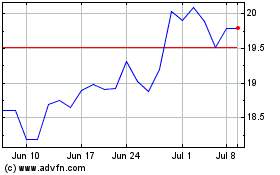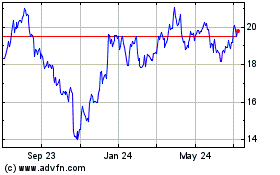Regions Financial Corporation Prices $900 Million Common Stock Offering
March 14 2012 - 9:22AM
Business Wire
Regions Financial (NYSE:RF) today announced that it has priced a
public offering of 152.9 million shares of its common stock at a
price to the public of $5.90 per share.
The common stock offering (the “Offering”) will generate gross
proceeds of approximately $900 million. The closing date for the
transaction is expected to be March 19, 2012.
The Offering is part of Regions’ plan to repurchase its Series A
Preferred Stock issued to the U.S. Department of the Treasury under
the Troubled Asset Relief Program (TARP) Capital Purchase Program.
The repurchase of the Series A Preferred Stock will be contingent
on approval by the Federal Reserve and Treasury Department and is
expected to follow the closing of the sale of Morgan Keegan &
Co. Inc. and related affiliates, which is anticipated in early
April. Regions intends to use the proceeds from the Offering and
the sale of Morgan Keegan along with other available funds to
repurchase the Series A Preferred Stock.
Goldman, Sachs & Co. is serving as Global Coordinator and
joint book-running manager of the Offering, J.P. Morgan Securities
LLC is serving as Capital Advisor related to our CCAR plan and
joint book-running manager of the Offering, and Barclays Capital
Inc. and Deutsche Bank Securities Inc. are serving as joint
book-running managers of the Offering. Morgan Keegan is serving as
lead manager.
This press release is for informational purposes only and is not
an offer to buy or the solicitation of an offer to sell, any
securities. Regions has filed a registration statement (including a
prospectus and prospectus supplement) with the Securities and
Exchange Commission related to the Offering. Before you invest, you
should read the prospectus and prospectus supplement in the
registration statement and other documents Regions has filed with
the SEC for more complete information about the company and the
Offering. You may obtain these documents for free by visiting EDGAR
on the SEC Web site at www.sec.gov. Alternatively, the prospectus
and prospectus supplement may be obtained upon request by
contacting:
- Regions Investor Relations,
205-581-7890;
- Goldman, Sachs & Co., at 200 West
Street, New York, NY 10282, toll free (866) 471-2526, Attention:
Registration Department;
- J.P. Morgan Securities LLC, c/o
Broadridge Financial Solutions, at 1155 Long Island Avenue,
Edgewood, NY 11717, Attention: Prospectus Department, or by calling
866-803-9204;
- Barclays Capital Inc., at 745 Seventh
Avenue, New York, NY 10019, facsimile number (646) 834-8133,
Attention: Syndicate Registration; and
- Deutsche Bank Securities Inc., 60 Wall
Street, New York, NY 10005, facsimile (212) 797-9344, Attention:
Equity Capital Markets Syndicate Desk.
The solicitation of offers to purchase our common shares will be
made only pursuant to the company’s prospectus, dated February 24,
2010, as supplemented by its prospectus supplement dated March 13,
2012, and related documents that the company has filed or will file
with the SEC.
About Regions Financial Corporation
Regions Financial Corporation, with $127 billion in assets, is a
member of the S&P 500 Index and is one of the nation’s largest
full-service providers of consumer and commercial banking, wealth
management, trust, mortgage and insurance products and services.
Regions serves customers in 16 states across the South, Midwest and
Texas, and through its subsidiary, Regions Bank, operates
approximately 1,700 banking offices and more than 2,000 ATMs. Its
investment and securities brokerage trust and asset management
division, Morgan Keegan & Company Inc., provides services from
over 90 offices. Additional information about Regions and its full
line of products and services can be found at www.regions.com.
Forward-looking statements
This press release may include forward-looking statements which
reflect Regions’ current views with respect to future events and
financial performance. The Private Securities Litigation Reform Act
of 1995 (the “Act”) provides a safe harbor for forward-looking
statements that are identified as such and are accompanied by the
identification of important factors that could cause actual results
to differ materially from the forward-looking statements. For these
statements, we, together with our subsidiaries, unless the context
implies otherwise, claim the protection afforded by the safe harbor
in the Act. Forward-looking statements are not based on historical
information, but rather are related to future operations,
strategies, financial results or other developments.
Forward-looking statements are based on management’s expectations
as well as certain assumptions and estimates made by, and
information available to, management at the time the statements are
made. Those statements are based on general assumptions and are
subject to various risks, uncertainties and other factors that may
cause actual results to differ materially from the views, beliefs
and projections expressed in such statements. These risks,
uncertainties and other factors include, but are not limited to,
those described below:
- The Dodd-Frank Wall Street Reform and
Consumer Protection Act (the “Dodd-Frank Act”) became law on July
21, 2010, and a number of legislative and regulatory proposals
remain pending. Additionally, the Treasury Department and federal
banking regulators continue to implement, but are also beginning to
wind down, a number of programs to address capital and liquidity in
the banking system. Proposed rules, including those that are
related to the various regulatory capital and liquidity proposals
and standards, referred to as “Basel III” adopted by the Basel
Committee on Banking Supervision, could require banking
institutions to increase levels of capital and to satisfy liquidity
requirements. All of the foregoing may have significant effects on
Regions and the financial services industry, the exact nature and
extent of which cannot be fully determined at this time.
- Regions’ ability to mitigate the impact
of the Dodd-Frank Act on debit interchange fees through revenue
enhancements and other revenue measures, which will depend on
various factors, including the acceptance by customers of modified
fee structures for Regions’ products and services.
- The impact of compensation and other
restrictions imposed under the Troubled Asset Relief Program
(“TARP”) until Regions repays the outstanding preferred stock
issued under TARP, including restrictions on Regions’ ability to
attract and retain talented executives and associates.
- Regions’ ability to complete the
contemplated repurchase of our Series A Preferred Stock issued to
the Treasury Department under the CPP.
- Regions’ ability to complete the
contemplated repurchase of our Series A Preferred Stock issued to
the U.S. Treasury under the CPP.
- Possible additional loan losses,
impairment of goodwill and other intangibles, and adjustment of
valuation allowances on deferred tax assets and the impact on
earnings and capital.
- Possible changes in interest rates may
increase funding costs and reduce earning asset yields, thus
reducing margins. Increases in benchmark interest rates would also
increase debt service requirements for customers whose terms
include a variable interest rate, which may negatively impact the
ability of borrowers to pay as contractually obligated.
- Possible changes in general economic
and business conditions in the United States in general and in the
communities Regions serves in particular, including any prolonging
or worsening of the current unfavorable economic conditions,
including unemployment levels.
- Possible changes in the
creditworthiness of customers and the possible impairment of the
collectability of loans.
- Possible changes in trade, monetary and
fiscal policies, laws and regulations, and other activities of
governments, agencies, and similar organizations, may have an
adverse effect on our business.
- The current stresses in the financial
and real estate markets, including possible continued deterioration
in property values.
- Regions’ ability to manage fluctuations
in the value of assets and liabilities and off-balance sheet
exposure so as to maintain sufficient capital and liquidity to
support our business.
- Regions’ ability to achieve the
earnings expectations related to businesses that have been acquired
or that may be acquired in the future.
- Regions’ ability to expand into new
markets and to maintain profit margins in the face of competitive
pressures.
- Regions’ ability to develop competitive
new products and services in a timely manner and the acceptance of
such products and services by our customers and potential
customers.
- Regions’ ability to keep pace with
technological changes.
- Regions’ ability to effectively manage
credit risk, interest rate risk, market risk, operational risk,
legal risk, liquidity risk, reputational risk and regulatory and
compliance risk.
- Regions’ ability to ensure adequate
capitalization which is impacted by inherent uncertainties in
forecasting credit losses.
- The cost and other effects of material
contingencies, including litigation contingencies, and any adverse
judicial, administrative, or arbitral rulings or proceedings.
- The effects of increased competition
from both banks and non-banks.
- The effects of geopolitical instability
and risks such as terrorist attacks.
- Possible changes in consumer and
business spending and saving habits could affect our ability to
increase assets and to attract deposits.
- The effects of weather and natural
disasters such as floods, droughts, wind, tornadoes and hurricanes,
and the effects of man-made disasters.
- Possible downgrades in ratings issued
by rating agencies.
- Possible changes in the speed of loan
prepayments by Regions’ customers and loan origination or sales
volumes.
- Possible acceleration of prepayments on
mortgage-backed securities due to low interest rates, and the
related acceleration of premium amortization on those
securities.
- The effects of problems encountered by
larger or similar financial institutions that adversely affect
Regions or the banking industry generally.
- Regions’ ability to receive dividends
from its subsidiaries.
- The effects of the failure of any
component of Regions’ business infrastructure which is provided by
a third party.
- Changes in accounting policies or
procedures as may be required by the Financial Accounting Standards
Board or other regulatory agencies.
- With regard to the sale of Morgan
Keegan (“Morgan Keegan Sale”):
- the possibility that regulatory and
other approvals and conditions to the transaction are not received
on a timely basis or at all; the possibility that modifications to
the terms of the transaction may be required in order to obtain or
satisfy such approvals or conditions; changes in the anticipated
timing for closing the transaction; business disruption during the
pendency of or following the transaction; diversion of management
time on transaction-related issues; reputational risks; any
downward purchase price adjustment; potential post-closing
indemnification expenses; and the reaction of customers and
counterparties to the transaction; and
- the effect that a delay in the
consummation of the Morgan Keegan Sale or our inability to
consummate the Morgan Keegan Sale will have on our ability to
repurchase the Series A Preferred Stock.
- The effects of any damage to Regions’
reputation resulting from developments related to any of the items
identified above.
The words “believe,” “expect,” “anticipate,”
“project” and similar expressions often signify forward-looking
statements. You should not place undue reliance on any
forward-looking statements, which speak only as of the date made.
We assume no obligation to update or revise any forward-looking
statements that are made from time to time.
Regions Financial (NYSE:RF)
Historical Stock Chart
From May 2024 to Jun 2024

Regions Financial (NYSE:RF)
Historical Stock Chart
From Jun 2023 to Jun 2024
